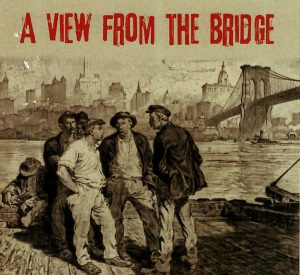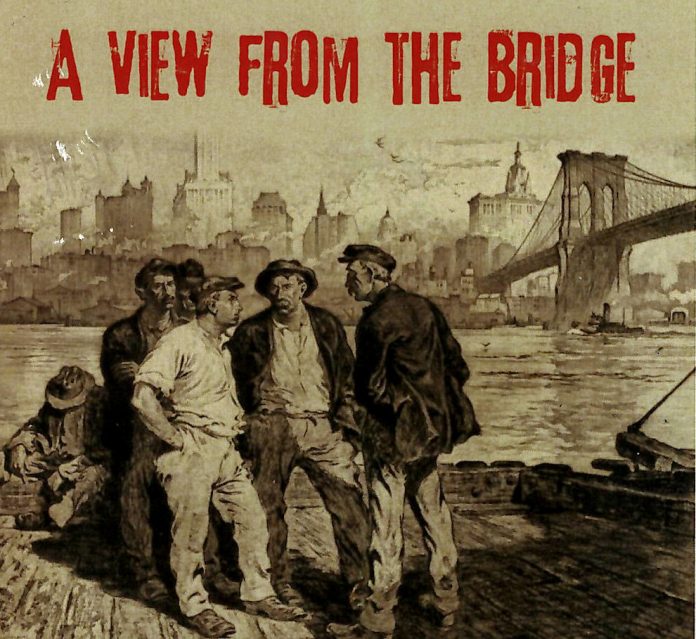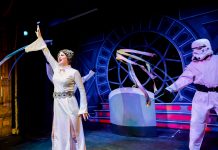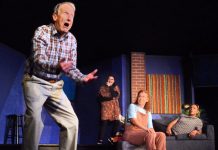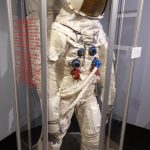According to the dictionary, a charade is “an absurd pretence intended to create a pleasant or respectable appearance.” The opening play at the Rogue Theatre in Tucson this season is A View From the Bridge by the great Arthur Miller. First performed in 1955, it has now been reimagined for a country grappling with a pandemic.
Before getting into that, what we have here is an important play that deals with issues that never seem to go away: the fear of being caught by immigration officials, and the relationship between masculinity and homosexuality. Seemingly disparate phobias, Miller managed to meld them into a body armour made of C-4 explosive. The triggering mechanism here is Sicilian honour, which does not mix with American jurisprudence. The attorney in the play is the bridge between American and Italian societal values; thus the word “bridge” in the title is a metaphor.
The actions of the lead character Eddie (played by Aaron Shand), reverberate throughout the play, bringing disaster to every other character. His repeated attempts to assert his masculinity are rebuffed, first with a test of physical strength, and then when he kisses the fiancee of his niece in an attempt to prove the fiancee is gay! It is all acted out against a set reminiscent of The Honeymooners on TV (also in the 1950s, when the play was produced), where the couple are clearly in poverty but not dirt poor: the wife has the basics, but no more.
The actors cannot be faulted for their performance of this tempestuous play, but given the limitations they have to work under, I found it more like a charade than a theatrical drama. My colleague Dr. Emanuele disagrees: he suggests that for those old enough to remember radio dramas, it is fine. So what are these limitations I speak of? First, all the actors (and the audience) wear masks, and the dialogue is not live but recorded. One cannot be sure that the voices the audience hears are the voices of the actors they are looking at, and all facial expression has been eliminated. Looking from the other side of things, the actors played to an audience of about 15 people, with the vast majority of seats empty. They may put a brave face on this (pun intended), but with the live theatre dynamic between actor and audience broken (or at least severely damaged), one can only hope this situation lasts no longer than a bad dream.
The coronavirus kills. It kills people, it kills community spirit, and apparently it kills theatre. It kills Live theatre – theatre of living experience. Now up until a week ago, representational theatre, the theatre of the mask, was dead too. At least in Tucson.
Mask theatre originated from ritualized, quasi-religious theatre of ancient Greece. It was used in the Middle Ages in the mystery plays of Christendom, and it was revived in the Renaissance and used by comedic theatre well into the eighteenth century. In the modern world, Noh physical theatre makes particular use of mask because Noh is highly representational and stylized. Otherwise, it really doesn’t exist. Until last week.
Starting last week, the Rogue theatre also is doing theatre of the mask. Unfortunately, it seems as if theatre of the mask should’ve remained in its eighteenth-century grave. After all, the theatre mask of Greece, even to those living in the eighteenth century, was a tool of expression and the masks were exquisite in expression. The actors at the Rogue wear masks that rather cut off all expression than enhance expression. They are safety masks; they are worn for corona-protection. But, in my very humble opinion, to do theatre in paper or cloth masks so that the face of the actors are not able to be seen at all, is not safe theatre.
And of course, because the actors can’t speak through those masks, verbal lines were pre-recorded. It’s not theatre at all. Oscar Wilde once said, “theatre is the most immediate way of connecting with a human being.“ That is not true when every actor on the stage is faceless. It would be rather like going to see a “live” orchestra, which has been pre-recorded, and the musicians merely sit in their seats on the stage with tape on their bows, and make the motions. The Rogue, I suppose, is making an admirable attempt to bring theatre back in the age of corona. Theatre has been in exile for the last six months; but if the terms of its return are that it has no face, and only a dictated voice, then it would do better to remain in exile.
The first portion of this review was composed by Drs. Cunningham and Emanuele. The concluding four paragraphs are by Mr. Salgado.
A View From the Bridge is playing through Sept. 27, 2020.
for tickets: www.TheRogueTheatre.org
